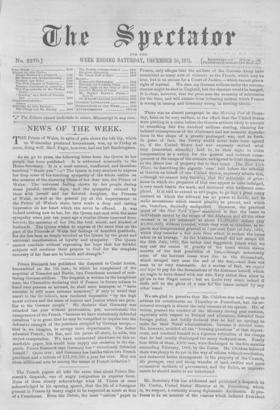There was an absurd paragraph in the .21forning Post of
Thurs- day, false on its very surface, to the effect that the United States were putting in a claim before the Geneva arbiters likely to amount to something like five hundred millions sterling, claiming for indirect consequences of the Alabama's and her consorts' depreda- tions in the shape of a greatly prolonged war, and so forth. In point of fact, the Treaty would never have been agreed to, if the United States had not expressly waived what they (somewhat absurdly) held to be their right to claim compensation as a nation for the general and indirect conse- quences of the escape of the cruisers, and agreed to limit themselves to the direct loss of property due to that cause. The Ne to York Times, in describing the gigantic 'case' laid before the tribunal at Geneva on behalf of the United States, expressly admits this, —though we cannot help thinking that the statement of griev- ances in which the preparers of that case appear to have indulged, is very much beside the mark, and tinctured with irrelevant com- plaint. It is said to extend to 480 pages, to go into a great many matters on which the tribunal has no power to decide, and to make accusations which cannot possibly be proved, and which are, therefore, decidedly undignified. However, the practical point of the New York. Times' statement is that the losses to individuals caused by the escape of the Alabama and all the other cruisers is as yet estimated at about 14,000,000 dollars (say /2,800,000), without iuterest, which they wish to calculate, as re- gards any obmpensation granted at 7 per cent. from 1st July, 1863, which they consider a fair date from which to reckon the losses taken on an average. As the Alabama herself did not escape till the 29th July, 1862, this rather cool suggestion places what we may call the centre of gravity of the losses within elevea months of the first possibility of loss,—though notoriously some of the heaviest losses were due to the Shenandoah, which escaped very near the end of the war,—and does not seem to us very reasonable. As a matter of fact, we expect and hope to pay for the devastations of the Alabama herself, which we ought to have chased with our own Navy rather than allow to go on in her illegal career ; but we doubt very much indeed if there will be the ghost of a case for the losses caused by any other vessel.


































